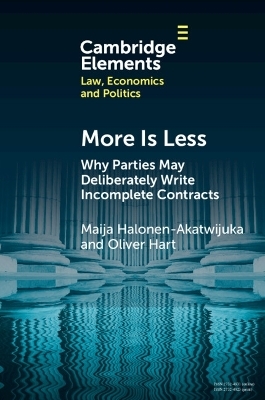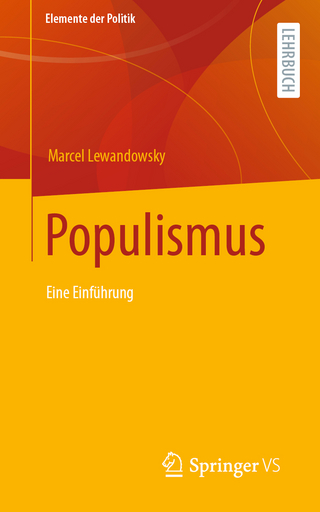
More is Less
Why Parties May Deliberately Write Incomplete Contracts
Seiten
2024
Cambridge University Press (Verlag)
978-1-009-39607-3 (ISBN)
Cambridge University Press (Verlag)
978-1-009-39607-3 (ISBN)
Why are contracts incomplete? Asymmetric information theories also have limitations. This Element offers an explanation based on contracts as 'reference points' showing if parties have different views about the division of surplus, an incomplete contract can be superior if including a contingency would lead to divergent reference points.
Why are contracts incomplete? Transaction costs and bounded rationality cannot be a total explanation since states of the world are often describable, foreseeable, and yet are not mentioned in a contract. Asymmetric information theories also have limitations. We offer an explanation based on 'contracts as reference points'. Including a contingency of the form, 'The buyer will require a good in event E', has a benefit and a cost. The benefit is that if E occurs there is less to argue about; the cost is that the additional reference point provided by the outcome in E can hinder (re)negotiation in states outside E. We show that if parties agree about a reasonable division of surplus, an incomplete contract is strictly superior to a contingent contract. If parties have different views about the division of surplus, an incomplete contract can be superior if including a contingency would lead to divergent reference points.
Why are contracts incomplete? Transaction costs and bounded rationality cannot be a total explanation since states of the world are often describable, foreseeable, and yet are not mentioned in a contract. Asymmetric information theories also have limitations. We offer an explanation based on 'contracts as reference points'. Including a contingency of the form, 'The buyer will require a good in event E', has a benefit and a cost. The benefit is that if E occurs there is less to argue about; the cost is that the additional reference point provided by the outcome in E can hinder (re)negotiation in states outside E. We show that if parties agree about a reasonable division of surplus, an incomplete contract is strictly superior to a contingent contract. If parties have different views about the division of surplus, an incomplete contract can be superior if including a contingency would lead to divergent reference points.
1. Introduction; 2. The model; 3. Is more less?; 4. Large gains in event; 5. Summary and conclusions; Appendix; References.
| Erscheinungsdatum | 14.05.2024 |
|---|---|
| Reihe/Serie | Elements in Law, Economics and Politics |
| Zusatzinfo | Worked examples or Exercises |
| Verlagsort | Cambridge |
| Sprache | englisch |
| Maße | 152 x 229 mm |
| Gewicht | 66 g |
| Themenwelt | Recht / Steuern ► EU / Internationales Recht |
| Recht / Steuern ► Privatrecht / Bürgerliches Recht | |
| Sozialwissenschaften ► Politik / Verwaltung ► Vergleichende Politikwissenschaften | |
| Wirtschaft ► Volkswirtschaftslehre | |
| ISBN-10 | 1-009-39607-2 / 1009396072 |
| ISBN-13 | 978-1-009-39607-3 / 9781009396073 |
| Zustand | Neuware |
| Haben Sie eine Frage zum Produkt? |
Mehr entdecken
aus dem Bereich
aus dem Bereich
Geschichte, Parteistruktur, Radikalisierung
Buch | Softcover (2024)
UTB (Verlag)
27,90 €


